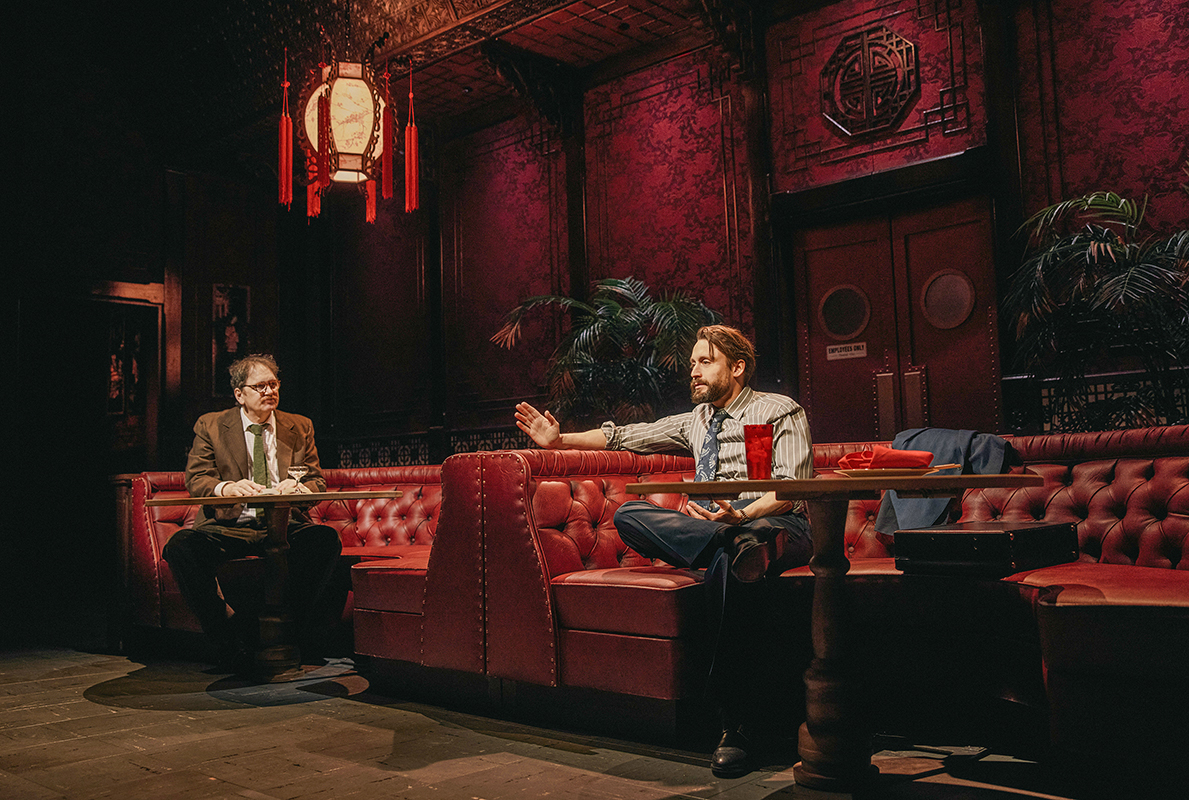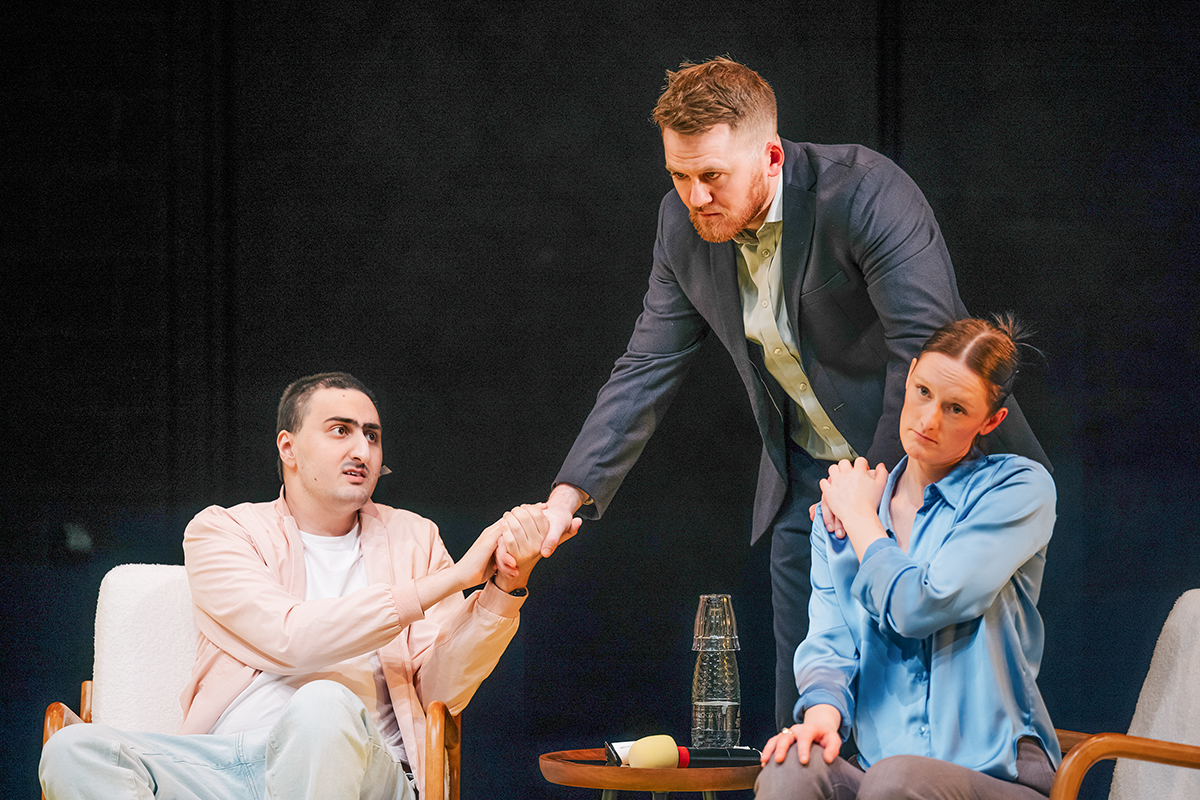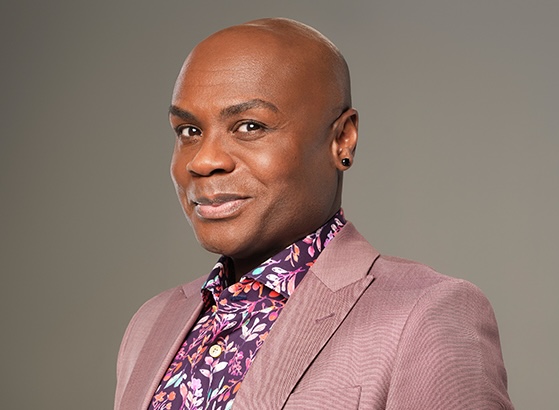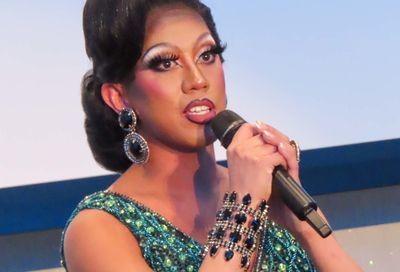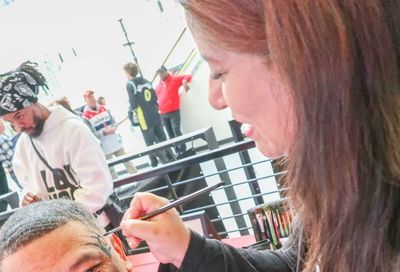Shameless
Topher Bellavia and Mark Chalfant of Washington Improvisational Theatre
“Kick him to the side of the curb.”
This is the somewhat brutal advice given by an audience member to Topher Bellavia last Saturday night at Shame, a new improvisational comedy show starring Bellavia and Mark Chalfant, both members of the Washington Improvisational Theatre (WIT!). It’s how the audience member thinks Bellavia should resolve one of three gay relationships we’ve watched evolve, develop and disintegrate over the past hour — an hour packed with big, gut-busting laughter and small yet significant poignancies. Another audience member gives similar advice to Chalfant for one of his characters.
“Remove yourself from the situation,” she says icily.
While there’s no literal kicking, both men do their duty and sever the two relationships by means both uproarious and bittersweet. Only a third relationship, unimpacted by audience involvement, shows a glimmer of hope for the future.
It’s the culmination of an evening of theater that’s funny, fresh and thoroughly engaging, an evening in which everything — including a song that carries the side-splitting refrain “I want you in my box” — is concocted by Bellavia and Chalfant on the spot.
 |
An offshoot production of WIT! (for which Chalfant serves as director of development) Shame, which plays this and next weekend at DCAC in Adams Morgan, is a potent, defining experience for these two gay and gifted actors. For their lucky audiences, it’s an enlightening and refreshing experience, one that examines and probes the meaning behind varying gay relationships. The big challenge for Bellavia and Chalfant, however, is not coming up with material, but getting people to take that very first improv plunge.
“People are apprehensive about improv the first time,” says Bellavia. “It’s kinda theatre. It’s kinda funny like standup, but it’s not that regimented. But once you come and see the format, you get hooked on it. You’ll come back and see it again and again and again.”
METRO WEEKLY: What inspired you to go into this style of comedy?
MARK CHALFANT: First, I should say that what we do is not exactly comedy, it’s improvisation. And improvisation is a craft, an art that often achives comedy. I didn’t go into it because I wanted to do comedy. I went into it because I love the process of improvisation, of what it’s about. What it’s fundamentally saying is that if you attend to what is going on, observe it and illuminate it, then you will find the next thing that needs to go on. It’s a very freeing way to work in theatre. And doing it over and over again, you just have so much fun, you end up unleashing comedy. But it’s never in your brain, like, “Oh I want to do that thing that’s going to be funny, that’s gonna crack ’em up.” You’re doing it because you’re enjoying the moment of actually doing it. So comedy is the result that just comes. And it’s funny because it deals with all of our lives.
TOPHER BELLAVIA: We say all the time, jokingly, “It’s funny because it’s true.” And we’re always aiming at the truth. In all our classes, we never teach people to be funny, but we can teach people to try to discover the truth. And when people see the truth onstage, they laugh. That’s the most natural response in most situations.
Of course, one of the reasons I do improv is because I can’t memorize anything. In college, when I was in scripted shows, I would get the general gist of my lines, which was fine for the meaning of the play, but for other actors, who need words and cues so that they can enter and exit, it was not fun.
MW: Is it fair to compare WIT! to Second City?
MARK: Certain structural similarities exist, but Second City primarily uses improv as a means to generate their sketch show. We’re focusing on improvisation as the craft.
MW: What happens in a typical WIT! performance?
MARK: Our current main show is called Big Bang, which literally means something from nothing. As we start the show, we might interact with the audience, we might get a word, a phrase. We might interview an audience member to get a picture of their life. We might start a series of scenes based on a word, or replay someone’s life onstage.
TOPHER: I came in about three and a half years ago. And I think we were doing mostly games, like Whose Line is it Anyway? The first half would be short-form games, the second half would be different kinds of long-form games. The problem with having the set list of who’s gonna do what is that if you’re not on stage you can check out and just wait until it’s your turn. We did away with the set list. Now we don’t know whether the next thing that’s going to happen is a scene, or a game, or a new scene or a continuation of a scene that happed before. Everyone’s just waiting on the sides to go in and to help whatever’s going on. We call this freeform because anything can happen at any time.
MW: So any performer can join a scene if they feel the muse strike?
TOPHER: The general rule is that if it looks like it’s really fun, stay the fuck out of it. And if it looks like it might be difficult or that things aren’t going as well as they could be, jump in.
MARK: Improv is a form that thrives on mistakes. If I misspeak or something, we’ll deal with that in a way that makes it seem like it was supposed to happen.
TOPHER: My second favorite quote from Miles Davis is “There are no mistakes.” My favorite quote from him is “Johnny Carson’s a sad motherfucker and I feel sorry for him.” I don’t know why. But anyway, everything that happens on stage is not planned out beforehand, so everything that happens is just one long series of mistakes. And since none of it was intended to happen in the first place, you can’t possibly do something wrong.
MW: How did Shame come about?
TOPHER: I saw Kiki and Herb — it was just very queer. And I consider myself pretty political. Not that this show is particularly political — it’s just that showing people’s personal lives is kind of a political act. So I felt some sense of responsibility as a gay man to do my part.
MARK: For me, there were a lot of incentives. One was just the challenge of doing a two-person show. Because it demands such a heightened degree of focus and attention. There’s this phenomenon we call the group mind — the information, the mood, the atmosphere, the pace of the show, it’s all stored and tracked by this group mind. And if you’re in a six-person show you’re one-sixth of this mind. In Shame, we’re each one half of that mind. So it’s just an incredible challenge, mentally, physically and artistically to be in there. It’s like running a marathon.
But the queer angle for me was also very exciting because in a larger totally freeform show you’re probably not going to deeply explore the sort of nooks and crannies of the gay experience. The odds of that happening are very slim, especially when the perspectives of most of the players are not colored by a queer sensibility. So the idea of “Hey, what if we do a two-man show and it’s all about queer stuff?” is like, “Wow, who knows who we’ll meet?” Because there’s so much of gay life that isn’t shown in theatre. It just isn’t explored, ever. Sometimes because it’s still secret. We don’t want straight people to see it because they might judge us, or they might not be comfortable with it. So I kind of feel like over the last decade gay theatre’s sort of gotten squeaky-clean scrubbed up.
TOPHER: And naked.
MARK: [Laughs.] And a lot of naked.
TOPHER: My theory is that to get gay guys to come see the shows, everyone has to be on stage naked.
MARK: When we were hawking our wares at the pride festival, handing out little handbills, several people asked me, “Do you guys get naked in your show?” It was the first thing they said.
MW: Do you?
MARK: If the audience really calls for it. We’ll do anything that feels like it’s the right thing to happen in our show. That’s the nature of being an improviser — you go where the show takes you.
TOPHER: But probably not. We don’t have any props and we don’t have any sets. So once you took off your pants people would be like, “Well why don’t have you have a real phone.” You can’t do one thing real and everything else mimed.
MARK: In one of the scenes in last night’s show, my character made a reference to Topher’s character as being enormously well-endowed. But if we were to actually strip —
TOPHER: [Laughs.] You asshole!
MARK: — then the illusion of theatre, of course, would have been destroyed.
MW: How do you two differ in your improvisational styles?
TOPHER: We’re very different. I do a lot of monkeys and robots —
MARK: And ninjas.
TOPHER: And ninjas. I’m more physical slapstick and you’re more —
MARK: Highbrow cerebral. [Laughs.]
TOPHER: You’re more emotional. But you got more laughs last night.
MARK: No, you got more laughs.
 |
TOPHER: No, you did.
MARK: No, I asked my sister to count and she said you got more laughs.
MW: Traditional theater is a process of building and repetition, and getting that repetition to seem fresh all the time. In your case —
MARK: We actually have the advantage of making it fresh and good every time.
MW: That must be exhausting, mentally and creatively.
MARK: But it’s infinite. Creativity is in fact infinite.
MW: What do you look for when auditioning new potential troupe members?
MARK: You have to be a good listener. You have to be respectful of the other players and focus on making them look good.
TOPHER: And you look for vulnerability. You can’t be funny and you can’t do improv if you’re not open to transformation, if you don’t leave yourself emotionally open.
MW: How often do you hold auditions?
MARK: About every nine months. We just had them in April so we’ll probably have them in December. The last round we picked twenty-eight new members.
TOPHER: We were filling some spaces in the big group. Then we started two new groups. So we’re probably not going to accept that many people ever again.
MW: Clearly, the past few years have been a time of amazing growth for the company. Is it self-sustaining?
TOPHER: Mostly through classes. Once people start taking our classes, they become really excited about the format or form and about WIT! It’s a very family-like atmosphere Â…
MW: Sounds like a cult.
MARK: There are elements of cultishness.
MW: I’m kidding.
MARK: But there’s a basis for your statement. For me, personally, improv is the closest thing I have to a religion. It’s not only how I engage in stage work, but I take its ideas with me into the way I try to lead my life.
TOPHER: The two years before I got into WIT!, I spent in my room, completely depressed, crazy depressed.
MARK: We refer to those as “the good old days.”
TOPHER: [Laughs.] When I started working on the principles of improv, I realized they were the same principles of life — really listening, really being present, paying attention to other people, and letting yourself be open to change and to change other people. I sound like a yoga teacher.
The point is all of life is an improv. The whole thing you’re making up as you go along. You are your own character and every interaction with someone is just a little piece of a scene.
MARK: And often the adventures you have that really resonate the most, that you really want to remember forever are the ones that weren’t on your agenda for that day. They just popped up. And for some reason, you responded the right way.
TOPHER: And you learn to say no. In improv it’s hard to do a scene like, “Hey do you want to go to the park?”
MARK: “No.”
TOPHER: “Okay, then.” See? It kind of comes to a grinding halt. But if you say, “Hey, you want to go to the park?”
MARK: “Yeah, let’s go to the park! Let’s get dogs!”
TOPHER: “All right! Let’s buy dogs!”
MARK: “Cool! I want ten!”
TOPHER: “And tattoos!” See? It’s a much more fun life when the answer is yes.
MW: If that’s the case, then why did you call the show Shame?
MARK: We were playing hangman and we needed a five-letter word. [Laughs.] No, we called it Shame because we were talking — actually, we were drinking and we were talking about the queer experience now, in this year 2003, about how there’s a certain sort of cookie cutter vibe to the face that gay culture presents to the rest of the world. We’re all clean cut and we’ve all got our domestic partners and a dog and we’ve moved into a real house into a suburb. And that’s not the life that either Topher or I lead. It’s not the life that most of our gay friends lead. There’s still a dark underbelly of the gay world that is a perfectly valid part of our existence. And we wanted to get at that, to counter the idea of let’s just clean up and wear our nice clean Gap clothes for the gay parade. There’s more that doesn’t fit into a daytime pride festival. Like places where you can go and have sex randomly with strangers, but it’s understood you’re not meeting them. You might not even ask their names. And if you see them on the street the next day, that didn’t happen.
TOPHER: In personal ads, people talk about being straight acting. That sounds like shame to me. You’re defining yourself by something that you’re not. It seems very defensive.
I’m proud of being gay, but for some reason I sometimes find myself ashamed of it. And I don’t know why after ten years of being out. In some situations I still don’t admit it because I don’t feel comfortable. Or like in front of my dad I still feel pressure to act macho. And he’s never put any pressure on me to be anything but who I am. But there’s this pressure of shame I feel. So in some ways I feel shame about being gay, but it’s obviously not so overpowering that I won’t go onstage and talk about it in public.
MW: I think most gay men feel automatic shame following their first experience. It’s almost a rite of passage.
MARK: Oh, totally. My first experience convinced me that I was in fact straight. Like, “Well I’m glad I tried that and could get it out of the way.” I wrote a five-page letter to my best friend from high school. She called me. She was a little concerned.
TOPHER: I came out to my parents when I was eighteen and I was sure they were going to stop paying for college or kick me out of the house. And what my dad said to me was, “Wow, that must have been really difficult for you to deal with all through high school without telling us.” And I was like, “Okay, why did I think these people would reject me?” Obviously I was ashamed of something. Obviously I think it’s bad and wrong. Was it straight culture making me feel ashamed of myself?
And then I go to Apex last night and everyone has their shirt off. And if I took off my shirt, it would reveal my hairy back — of which I’m totally ashamed. I don’t know why. It’s just hair coming out of my back. I’m Sicilian, what the fuck do you want? But I’m ashamed of it. Why am I ashamed of it? It’s an identity based on being defensive about something.
MARK: We each carry our own personal shame. But the shame most resonant for me is this uber-shame. Shame on all of us for making the society this way, for participating in it. Because in some way, I’m definitely participating in somebody else feeling really crappy about themselves right now. I might not know I’m doing it, but if I would just connect a little bit more, I might see it.
MW: How would you encourage people who’ve never seen improv to come experience Shame?
MARK: I’d say that the thing you come to see improv for, for me, is the incredible cooperation and synchronization between the players, whether it’s a six-person ensemble or a two person show. The amazing thing, when I see good improv, the thing that makes me just impressed beyond belief is the way people are able to listen and respond to each other. It’s what scripted theatre is always striving for. Right? They always want the moment to always seem like it’s just happening now for the first time. But in improv, that’s your strongest suit, because it really is.
TOPHER: A — it’s only like about an hour and fifteen minutes. B — it’s only ten bucks. C — there’s nice restaurants around Adams Morgan. And D — if you really don’t like it come up to me afterwards and I’ll give you back your ten bucks.
Shame plays at 10 p.m. on Friday, June 20 and 27, and Saturday, June 21 and 28, at DCAC, 2438 18th Street NW. Admission is $10. It’s preceded each evening by a 7:30 p.m. performance of Big Bang, the latest show by WIT!, admission to which is also $10. Call 202-462-7833 or visit www.dcwit.com for more information.
Support Metro Weekly’s Journalism
These are challenging times for news organizations. And yet it’s crucial we stay active and provide vital resources and information to both our local readers and the world. So won’t you please take a moment and consider supporting Metro Weekly with a membership? For as little as $5 a month, you can help ensure Metro Weekly magazine and MetroWeekly.com remain free, viable resources as we provide the best, most diverse, culturally-resonant LGBTQ coverage in both the D.C. region and around the world. Memberships come with exclusive perks and discounts, your own personal digital delivery of each week’s magazine (and an archive), access to our Member's Lounge when it launches this fall, and exclusive members-only items like Metro Weekly Membership Mugs and Tote Bags! Check out all our membership levels here and please join us today!




